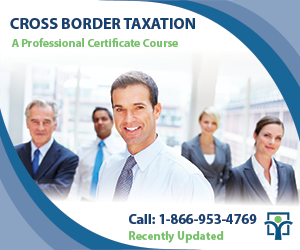Last updated: February 16 2016

Compliance Alert: Cross Border Taxes, Rights and Regulations
Cross border taxation is increasingly of interest to tax advisors and their clients, particularly if they are US citizens living in Canada. The cost to renounce US citizenship, for example, has recently increased to $2350; while challenges to tax filing compliance have failed, so far.
Tax specialists should be sure to inform their clients of last fall’s failure of a court challenge by Americans living in Canada, who attempted to block the Canadian government from providing tax information to the IRS.
The Federal Court of Canada ruled last fall that CRA’s collection of the information from large Canadian banks to be turned over to the IRA, does not violate the terms of the Canada-U.S. tax treaty. However, Justice Luc Martineau did not rule on the arguments that the collection of the information violates the Charter of Rights and Freedoms.
Students enrolled in Knowledge Bureau’s Cross Border Taxation course, have been keeping an eye on the developments. This online certificate course teaches the key concepts surrounding residency, non-residency, immigration, emigration, taxation of U.S. citizens and residents in Canada and vice-versa, as well as other the taxation issues surrounding cross-border transactions from a Canadian and U.S. point of view.
Advisors who work with affluent boomers, especially or those who live and/or work in the US, must be prepared to discuss cross border taxation with a comprehensive general knowledge, as well as recognize and advise on how certain actions on both sides of the border affect a person’s tax situation.
“This course is highly beneficial and covers a wide breadth of topics in sufficient depth,” said Knowledge Bureau graduate Dan McGeown. “It assisted in developing my understanding of U.S. taxation as it pertains to cross border tax situations. The knowledge and skills gained during this course increases the value I can add to our firm's clientele when they have cross border tax issues.”
 |
The course includes all relevant recent tax changes including:
- Planning surrounding the lifetime gift and estate tax exemption, which has increased to $5,430,000. (The tax rate on amounts over the exemptions is 40%)
- Lifetime gift exemption not available for non-residents/non-citizens
- Non-residents of the U.S. who meet the substantial presence test in the current year (i.e. file treaty form 8833 to claim closer ties to Canada) are required to abide by foreign reporting rules
- Temporary employment earnings of up to $10,000, per employer, in an individual’s non-resident country is not taxable in that country under the Canada-U.S. Tax Convention for federal purposes (state taxation is different)
Chapters end with multiple choice and true-to-life scenarios which test the practical application of the key concepts covered in the course. Actual time spent is influenced by factors such as the student’s background and individual learning style.
Salpy Boghossian, Distinguished Financial Advisor, Tax Service SpecialistTM, said Cross Border Taxation is an ‘excellent course’. “(It is) well written, easy to understand and full of tremendous information. I would recommend this course to other financial planners."
Knowledge Bureau’s Cross Border Taxation course is a component of the Distinguished Financial AdvisorTM – Tax Services Specialist designation.
For more information about Cross Border Taxation, click here.





